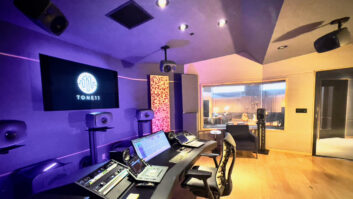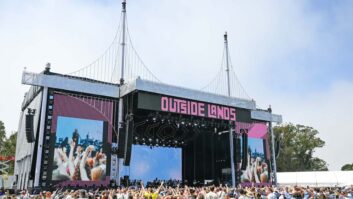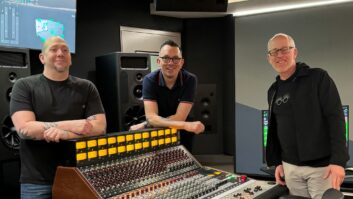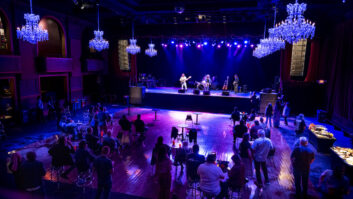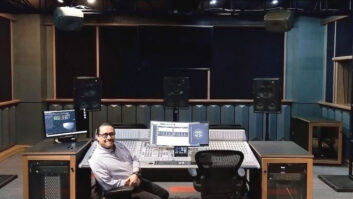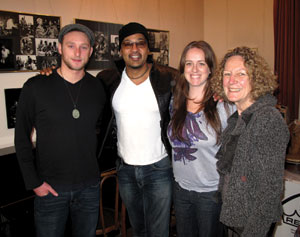
Studio 401 and the Duduvudu Project
L to R: Jody Scott, Thomas Dyani, Chloe Scott and Barbara Pukwana
Studio 401 recently completed the Duduvudu project, which celebrates the music of the late South African saxophonist Dudu Pukwana and the long, unique history of South African jazz. Dudu and the all-star band, The Blue Notes, left South Africa in 1964, the same year that the late Nelson Mandela began his 27-year prison sentence. The Blue Notes (Dudu, Johnny Dyani, Chris McGregor, Mongezi Feza and Louis Moholo) came to London and changed the face of European jazz with their wild inside/outside/folkloric “who cares about the label—no boundaries” approach to music.
The project has been a true Studio 401/Scott family affair under the musical direction of the renowned flautist Chloe Scott and the production team of trumpeter Jody Scott and drummer/ Studio 401 owner Andrew Scott. The CD was mastered by Michael Romanowski and is currently being circulated for label interest.

Dudu Pukwana
The foundation tracks were recorded at The Premises in London on an SSL using a range of API and Neve outboard gear, and Royer, Coles and AEA ribbon mics, as well as the ubiquitous Neumann U 87. Additional tracks and overdubs were added at Studio 401 in San Francisco.
The London sessions involved musicians and family members who were most closely connected to and played with Dudu and The Blue Notes, including Dudu’s wife, Barbara Pukwana, Hazel Miller (of Ogun Records, widow of Harry Miller, the South African bassist who replaced Johnny Dyani in The Blue Notes), and Veronica Beckett (widow of the iconic trumpeter Harry Beckett). The London musicians included Annie Whitehead (trombone/co-musical director for the London sessions); Harry Beckett and Jody Scott (trumpet); Pierre Dørge and Dave Draper (guitars); Chloe Scott (flute); Nick Stephens (bass), Mark Sanders (drums), and Thomas Dyani (percussion; Johnny’s son, currently with Shakira). This was Harry Beckett’s last recording session.
Additional recordings were added to complete the full project using musicians in the SF Bay Area with some creative new arrangements. Also included were a couple of earlier recordings by Kombo Kwela and one by seminal world-beat band The Rhyth-o-matics, engineered by Fred Catero and produced by Bob Johnson.
Studio 401 continues to work in the Bay Area and internationally, recording, mixing and mastering in the studio and on location as well as offering production, live sound and video services.
Lucid Rays at El Cerrito Studio

L to R: Vic Griffith, drummer; Dave Guglielmana, bass player; Oscar Autie, studio owner/producer/engineer; Asher, lead guitar; TC Morse, vocals and rhythm guitar
Produced and engineered by studio owner Oscar Autie, classic rockers Lucid Rays recently recorded their debut album Hard Time in the City at El Cerrito Studio.
“Hard Time in the City was a very experimental and fun project,” says Autie, who also played percussion on tracks 1, 7 and 10. “The idea was to attain classic-rock sounds with a modern twist.”
Autie was able to capture a warm sound in the drum set using a Universal Audio 4-710d 4-Channel Tone-Blending Mic Preamp with Dynamics. “I’m not a fan of using EQ when recording; I prefer to use my mic techniques to capture the sound I want to attain,”he says. The song “Another Battle” features the studio’s Yamaha C1 Baby Grand Piano. According to Autie, the project was mixed using “Pro Tools and a lot of Universal Audio plug-ins.”
Coast Recorders Hosts Live Tom Rhodes Session

The Tom Rhodes session at Coast Recorders wasn’t your typical recording session—it was more of a live-performance. The idea was that the band would perform the entire album front to back in front of an audience of their friends and peers, capturing the vibe and spontaneity they would get at a show but with the controlled acoustics of the studio environment.
The core band was composed of Tom Rhodes on acoustic guitar, Fender Rhodes and lead vocal; Andrew Laubacher on drums; Oscar Westesson on upright and electric bass; and Rory on acoustic and electric guitars. They were backed up by the three-piece vocal group The Lady Crooners (Nadia, Joseph and Megan Krilanovich) and special guests James DePrato on electric guitar and Tim Marcus on pedal steel. From November 22-25, 2013, the band convened in the afternoon at Coast to work on specific songs, with everyone performing live in the main tracking room. Co-producer and engineer Charlie Wilson would record all of the rehearsals, and by 8:30 p.m. the audience members—made up of local musical peers and friends—would show up, and the performance would begin. The guests were seated on couches dotted around the room, and were all fed their own headphone mix straight off the console so they would get a real hi-fi experience.
“The only things isolated were the guitar amps, which were in the iso booth,” says Tom Richardson of Coast Recorders. “Everything else in the room was live, so separation between instruments and singers was a challenge. Tom was playing and singing on a riser, and Charlie used a pair of sE RN17 mics in a mid-side configuration, which proved to have incredible rejection of anything else going on in the room. He sang through a vintage Neumann U 67. Andrew Laubacher’s drums were surrounded by four huge gobos in the far corner of the room and were close-miked and also miked from above with Josephson C617 omnis and a stereo AEA R88.”
At the end of the four days, the band had amassed numerous takes of each song and began to sift through the best performances. “No overdubs were needed and no fixing of things was done; they relied on having perfect performances,” Richardson says.

